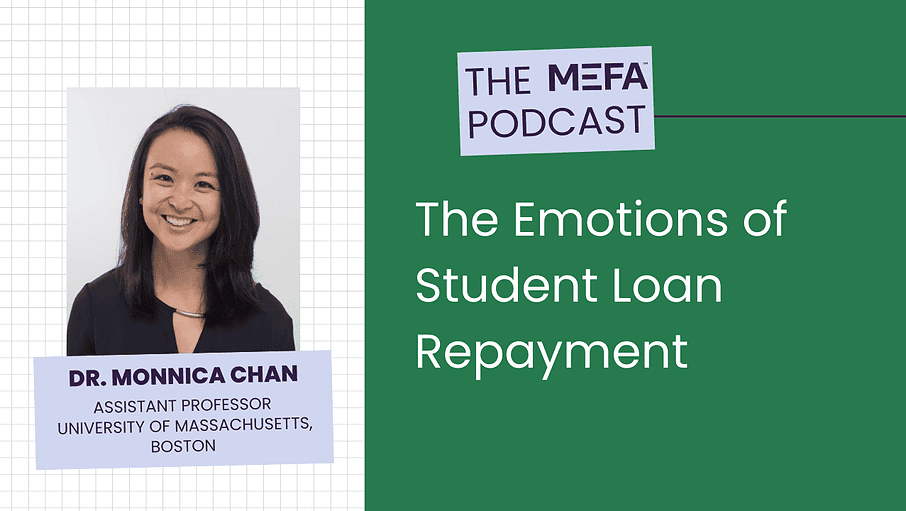

Resources Mentioned in this Episode
Monnica Chan: [00:00:00] Like my personal journey, I think in some ways I was lucky, right? I lived in the rights of code. I had a, access to a really nice public high school ended up going to a liberal arts school for college, did not expect to be in education but afterwards I, I, after college I did a meritorious term of service at a community college in New Jersey and so I got to work with students in a student leadership and development program.
And because that program also awarded federal work study dollars to students, there was this interesting intersection where students were coming to meet because they were, being tagged for a FAFSA verification and they needed, they didn’t understand what that meant or they didn’t, were having trouble filling out their timesheets in order to receive the federal work study funds.
And I think seeing that really [00:01:00] opened my eyes to just how complex of a system we have. For 18 year, 19 year olds, who are trying to figure out who they are and also at the same time learning a new institution, but then also there’s this very large kind of bureaucracy in place that they need to navigate in order to just continue going to school.
Jonathan Hughes: Hi, everyone, and welcome to the MEFA podcast. My name is Jonathan Hughes, and you just heard from our guest on the show, Dr. Monnica Chan. She’s an assistant professor at the University of Massachusetts, Boston, and is here to discuss her work in education policy, particularly surrounding federal student loan repayment.
And I’m really excited for you to hear this show because we talk and have talked a lot on this show about. Paying for college, about financial aid, about saving for college, about scholarships, but we haven’t really talked so much about student loan repayment, which is a [00:02:00] huge topic and a sometimes dizzying experience for borrowers to get their heads around, which is exactly what we’re going to talk about with Monica today.
And you get to hear about her work in that field and her thoughts about education policy. Of course, MEFA doesn’t advocate for any specific educational policy, it’s important to note that, but I think you’ll get a lot out of hearing this. I’ll be back afterwards to wrap up, but now, let’s meet our guest.
Monnica Chan: So my name is Monnica Chan, and I’m an assistant professor at the University of Massachusetts, Boston in the College of Education and Human Development.
Jonathan Hughes: And what is the, what’s your focus currently?
Monnica Chan: Aside from teaching and all of that my research focuses on college affordability.
So I’m really interested in understanding how students pay for college and how all the policies and programs that we have in this country, like student grant aid and loan aid support and impact students.
Jonathan Hughes: And what interests you about that?
Monnica Chan: That’s a really good question. I’ve been in the kind of college [00:03:00] affordability financial aid space for a while maybe less so on the research end.
But now I think being in the research end, it’s just, it’s a really interesting time. I think we’re in this policy paradox, right? Where decades ago we tried to build a system that would be affordable. It shifted to loans, and at the same time, the government began investing less in higher education, and it became more expensive.
And we’ve been asking students and families to pay more and more of the cost of education over time, and now we’re in this position where there’s a lot of debt. It’s taking folks a long time. To pay it off. And it’s starting to have these bigger implications now, both around, home ownership and family formation, but then also in terms of do people even want to go to college because it’s so expensive.
And I think that sort of policy paradox to me as someone who I think, really benefited from education and I think believes in the opportunities that it can give to students. That’s really challenging, right? We spent a [00:04:00] long time as a policy community working on college access and now.
I think all of that work is at risk if we don’t somehow understand a little bit better how to improve the current system that we have.
Jonathan Hughes: And so may I ask you about your own personal sort of journey to this point? What is your educational journey been and how has that influenced you’ve talked about a little bit just then, but if you could expand a little bit on how this has influenced the way you see this issue.
Monnica Chan: My personal journey, I think in some ways I was lucky, right? I lived in the rights of code. I had access to a really nice kind of public high school ended up going to a liberal arts school for college, did not expect to be in education. But afterwards I, after college, I did an AmeriCorps term of service at a community college in New Jersey.
And so I got to work with students in a student leadership and development program and because that program also awarded federal work study dollars to students, it was this interesting intersection where students were coming to me because they were, [00:05:00] being tagged for FAFSA verification and they needed, they didn’t understand what that meant, or they didn’t, were having trouble filling out their timesheets in order to receive the federal work study funds.
And I think seeing that really opened my eyes to just how complex of a system we have for 18 year, 19 year olds, who are trying to figure out who they are and also at the same time learning a new institution, but then also there’s this very large kind of bureaucracy in place that they need to navigate in order to just continue going to school.
And that raised a lot of questions for me. So I ended up Moving to Boston to get a master’s in higher education to learn a little bit more about the field. And I ended up getting into the public policy space. So I was lucky enough to work with the six New England states on different higher education policy issues.
College affordability was one of them. And from there, I, I started getting asked questions and asking questions myself about how do we know if a policy is working for a [00:06:00] particular group of students? And I didn’t feel that I had the tools in my tool bed to answer that question.
How do I know if this policy is good for this state or for this particular population of students? What is the evidence that I’m using to answer that question? My gut feeling alone I didn’t feel like that was sufficient. So that’s why I went back to grad school and I learned all about what academic research is and, what is one form of evidence that we can use to answer these questions.
And so now here I am at UMass Boston getting to work with students and helping them think about evidence. And we all learn together about. Yeah. What do we think is proof that something works and is worthy of scaling up?
Jonathan Hughes: Getting into that then, can we talk a little bit more about the work that you have done recently regarding loan repayment?
Monnica Chan: I recently wrapped up data collection this past winter. On a project with support from the Hildreth Institute. I’m trying to understand how recent college graduates are thinking about [00:07:00] student loan repayment at a time when I think loan repayment has, it’s been in the news a lot, it’s come under fire a lot.
Are loans going to be forgiven? Are they not? Is this repayment plan from the federal government going to hold water or not? And. And I think the policy conversation and the media conversation about that, I think can potentially cause a lot of confusion or thoughts among borrowers. And so we were trying to unpack that a little bit, particularly for folks that were, Just in the process of, so the way federal student loans work, maybe some of your listeners will probably already know this, but just in case when you’re in school, there are some student loans where you don’t have to pay back right away and they won’t accrue interest, right?
Particularly the unsubsidized federal loans. And then through the federal student loan program, once you stop enrolling in college or earn your degree, there’s a 6 month grace period. After which you then enter into repayment and your loans start to be due. And so we [00:08:00] interviewed students that were just moving through that six month period.
So we did a series of interviews right around the time of graduation. And then six to seven months later, and then we followed up with folks a year later. And so it’s just a. It was nice for me to learn about how so many folks are thinking about loans and hearing how people’s stories changed and also just how their lives change, right?
It’s a very tumultuous time when you graduate and suddenly you need to move and find a new apartment and a new job and all of that.
Jonathan Hughes: And what years or year was this study done? What was happening? Around that time, because the past few years have been pretty momentous for everybody.
Monnica Chan: Yeah. Yeah. It really has in so many ways. So we started the study in the spring of 2022. So this was the time when the Supreme Court had not made a ruling on Biden’s loan forgiveness plan. And so I, I think many folks in our study were hoping [00:09:00] that forgiveness would go through. And so there’s like a thread of that in many of our conversations with folks, and then it ended up, not going through and people’s loan repayments did start.
The even, through the grace period, they didn’t have to pay loans, but there was also the administrative forbearance on loans as well during this time because of the COVID sort of emergency relief.
Jonathan Hughes: Right. So this was a time when, if I can just think back to myself, cause I was trying to remember.
So there was, it was in the repayment pause, is that right? So there was no payments being due because of COVID. There was no interest being assessed because of COVID, right? These are federal student loans. The plan to forgive. Up to 10, 000 for some bars, up to 20, 000 for others had been announced, but it hadn’t yet, we didn’t know [00:10:00] exactly. What was going to happen is that accurate?
Monnica Chan: Yeah.
Jonathan Hughes: How many people were followed in this study?
Monnica Chan: Yeah, just under 25, because we touched people at three different points now all 25 participated in all three points.
Jonathan Hughes: The three points were graduation?
Monnica Chan: May and June. Yeah, May, around May, June of 2022.
We did have some August degrees, so not everybody had graduated. And then we spoke to them again in January of 2023. So by then, even our August graduates had graduated. And then we reconnected with folks one last time like December, 2023, January, 2024.
Jonathan Hughes: And what did you discover?
Monnica Chan: Something that I guess I was surprised by is just how much variation there was across individuals in their journeys and experiences with loan repayment and the changes over time.
In the beginning of the study around May, June of 2022, right? Everybody’s in the process of graduating. They’re looking ahead and we. What [00:11:00] are your loan repayment goals? And almost everybody was like, I want to pay my loans as quickly as possible. Some people had a very clear plan on how they would do that.
And other people were like, I’m going to pay them off in five years. I don’t know how I’m going to do it, but I’m going to do it. Some were even like, I want to pay them off in one year, which I think is great to have these sort of aspirational goals. And then as time went on, I think.
This, these sort of goals would change and the stress and burden that people talked about right when we asked them Why do you want to pay it off so quickly? People are like because I don’t want I don’t want to owe anybody anything It’s very stressful to have this burden just it’s just on my mind all the time and I just want it I want to get rid of it That stress and burden would change, I think, depending on their other situations, right?
So as things fell into place, or they didn’t in terms of living and employment situations for some students, I think those who enrolled in grad school or, found gainful employment that where they were able to repay their loans. [00:12:00] It just became another monthly bill that they were able to manage and it was fine.
For others, I think in more precarious situations, say they were on per diem contracts with their employer or their financial situation was, a little bit more precarious, I think then loan repayment became even more of a concrete burden than the abstract weight. That it was when they were in the process of graduating there were even some students that I think had really unexpected life situations happen, like injuries at work or kind of dependent care needs that just really, I think derailed.
The plans that they had in their mind, right? Even if they were thinking, I’m going to plan for retirement and here’s how my student loan is going to interact with that getting derailed by what some of these big life events created this situation when they were like, I haven’t. Even thought about that, or I’m not even paying right now.
And I don’t know if that’s okay. And it was something that, they just weren’t thinking about because they were trying to manage all of these [00:13:00] other things in their life. And I think that sort of branching out of people’s life journeys we see that happen in other ways, right?
People move to different states or personally and professionally, I think people end up branching out after being all together in one community in college, but this particular branching out around student loan repayment, I think, just can have very large consequences for folks. And so I think in that way, I realize I’m now going way into detail as opposed to big picture findings. But I think just being able to document that for us was like a really big honor.
Jonathan Hughes: What do you think are the prime emotions that come up regarding repayment?
Monnica Chan: I think some of it is really tied to where, like which branch folks are on. I think for those who have a very, Secure future that they can see. I think repayment becomes, yes, this was an investment that I decided to make and myself, and it was worth it and I needed to do it and I need to make [00:14:00] it work in order to support my family. Hands down. It’s fine. I think for others, it was I don’t know how I’m going to make this next payment or my.
Family member is helping me pay my student loans right now. And I don’t know if like in the future sustainably, whether that’s possible and what to do. And I think there was this feeling of being very overwhelmed. There were, others who I think said, I just, I had like a mental break and I needed to step away and I used up all my savings as a result, but I just needed to not think about finding a job to pay my student loans and pay all my other bills at this time.
I think, That emotion also morphed into like commentary on the system, right? I would say regardless of what branch students were on, I think, or borrowers were on, there was like this refrain of college is just too expensive. And we’ve made this choice as a country where other [00:15:00] countries have not made this choice.
And why did we make this choice? Why is college so expensive? And that it just wasn’t a sustainable model. Okay. And I think this feeling of, but I’m a little guy this is the system that we’re in and I don’t like it, but this is the system that we’re in.
Jonathan Hughes: I want to underscore the fact that not every student, as you already mentioned, from an economic standpoint, or not every population, Faces the same challenges right in these regards. Is that something that you saw within the study?
Monnica Chan: Yeah. Yeah. Oh, absolutely. Yeah You know our study population was quite diverse. We had I guess what some folks would call returning adult Students who are trying to make a career change. We had students who were parents and we also had, I think, what folks often think of as the traditional financially dependent students.
So students who are younger than the age of 24 still financially dependent on their parents entered college at 18, graduated in at 21, [00:16:00] 22 attended full time the whole time. So we saw a range there. And I, I do think we also had some international students. I think that there is, some ways in which these social identities interacted with students loan repayment experiences.
But I think in some ways that’s to be expected, given sort of the way that we know that this country is both racially and socioeconomically. stratified, right? Opportunity is stratified along social identities. And that’s very hard to separate. And so I, I think we can see that in terms of like labor market outcomes and also the loan repayment outcomes, which I think interact very tightly with the labor market outcomes.
Jonathan Hughes: It seems like there may be a fair amount of confusion Surrounding not just the loan repayment, but also the cost of the education itself. Why is it expensive? Why are we in this system that [00:17:00] I need to borrow these funds that you mentioned earlier? I’m a little guy here. What can I? How can I find my way through this?
Bearing in mind that this is a policy sort of discussion that this is a design system. What should people know about? Policy that they don’t, if they’re not thinking about it in that way.
Monnica Chan: Yeah. Yeah. I was thinking about this and thinking about all the work that you all do with students and families.
And I think something that I’ve learned through this project that, perhaps might be a learning for other folks too, is this policy and the policies around student loan repayment are in some ways so complex because policymakers are trying to find solutions. To solve problems, right? And when I hear about all of the different repayment plans that are out there, it’s very daunting, right?
And I think it’s easy to [00:18:00] get overwhelmed. And I think for a parent or for a borrower who’s thinking about repayment, I think something to keep in mind is that there is a program and yeah, there is a loan repayment program That can maximize and meet your needs. It’s just a matter of finding and navigating that program that creates, of course, right?
Like having a system where it’s the onus is on the borrower to try to navigate and find the policy solution definitely creates, I think, inequities for folks, right? Who has the time and the knowledge and the language ability to be able to navigate that. That’s a lot, right? But there are resources out there.
Where if you feel like you needed help to navigate that, you could do that. The FSA website has a lot of resources. Tesla has a lot of resources. MEFA has a lot of resources. And so I, I think even though it can feel daunting I think the lesson that I’ve learned is that there, there is a light at the end of the tunnel.
Jonathan Hughes: Is [00:19:00] there any tip or any particular principle that you’ve seen help students with success in navigating this sort of confusing process? Is it to note that there are so many resources available?
Monnica Chan: I think that’s part of it. I think first step, right? Is if I were thinking about these students that I used to work with I think my first question would be like, what are your goals?
And I think being very clear on the long term financial goals that you have and also the shorter term kind of financial needs that you have because the answer to those questions will then determine which repayment plan is best. The default 10 year repayment plan that everybody is enrolled in might not be right.
Because it presumes that, your income won’t grow over time. It’s just a flat payment, like a mortgage payment every month. And in the beginning, when you’re looking for a job, that, that payment might be too high and that’s okay, right? That’s why there’s income based repayment plans.
That’s why the [00:20:00] save plan was created. And so I think taking a look at like your own situation first is the kind of takeaway message that I. Would share with folks if I could share a message just because I think the other way that I think about policy and these sorts of things is that public policy is never going to be a scalpel, right?
It’s always going to be like the big butcher knife that’s trying to solve the problem in kind the kind of the way that meets the middle, right? It’s going to try to meet the middle for as many people as possible and optimize that. And so for an individual situation that may not match that kind of middle ground that a public policy is trying to design.
You have to then think about, okay what are my own priorities, right? The 10 year repayment plans. That’s the default for everybody is a good example that might not fit for everybody. Okay. And so as an individual, you just have to figure out [00:21:00] whether or not that fits with your goals and with what you have available now.
And if it doesn’t just remember there’s a solution. And then I think that’s where the resources come in.
Jonathan Hughes: Well , Monnica was the, again, it was my pleasure. And I hope what do you, if you’re working on something now that we can talk about later on or working on something next that we can talk about later on, I’d love to have you back on to talk about it.
Monnica Chan: Yeah, that would be so fun. Thank you.
Jonathan Hughes: Thank you so much.
Monnica Chan: Thank you.
Jonathan Hughes: All right. That was our show, everyone. I’d like to thank Dr. Monnica Chan for being here and sharing her work with us and her expertise. And folks, if you liked what you heard today and you want to hear more from us on planning, saving and paying for college, as well as career readiness then you can follow the show and you can do that wherever you find your podcasts.
And please remember to rate and review us. It helps us to keep doing what we’re doing and [00:22:00] getting this show out. To folks like you. I would like to thank our producer Shaun Connolly. I’d like to thank AJ Yee, Lauren Danz, Lisa Rooney, and Meredith Clement for their assistance in getting this show posted.
Once again, my name is Jonathan Hughes and this has been the MEFA podcast.











